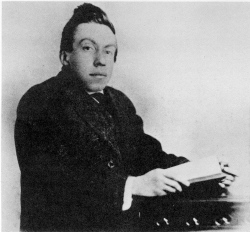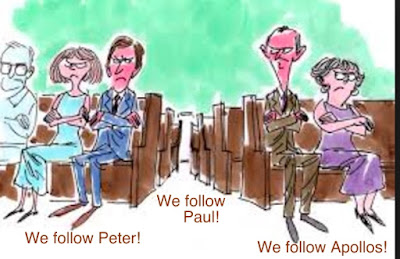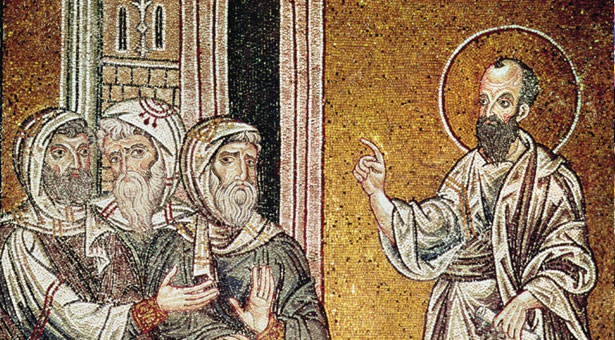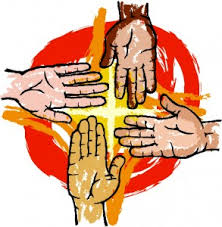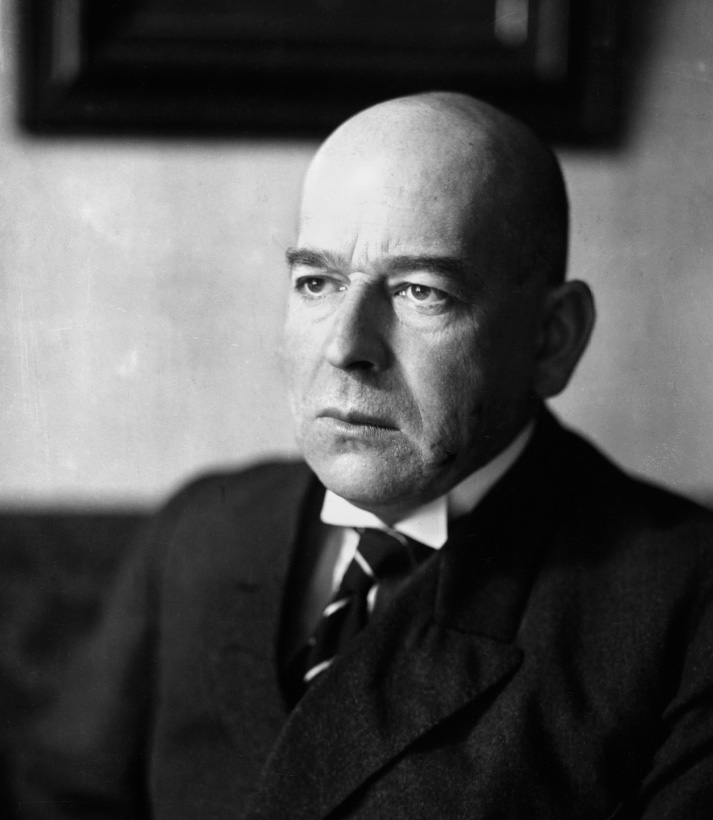2 Samuel 17:1-29 (The Message)
2 Samuel 17
5 But then Absalom said, "Call in Hushai the Arkite—let's hear what he has to say."
6 So Hushai came and Absalom put it to him, "This is what Ahithophel advised. Should we do it? What do you say?"
7-10 Hushai said, "The counsel that Ahithophel has given in this instance is not good. You know your father and his men, brave and bitterly angry—like a bear robbed of her cubs. And your father is an experienced fighter; you can be sure he won't be caught napping at a time like this. Even while we're talking, he's probably holed up in some cave or other. If he jumps your men from ambush, word will soon get back, 'A slaughter of Absalom's army!' Even if your men are valiant with hearts of lions, they'll fall apart at such news, for everyone in Israel knows the kind of fighting stuff your father's made of, and also the men with him.
11-13 "Here's what I'd advise: Muster the whole country, from Dan to Beersheba, an army like the sand of the sea, and you personally lead them. We'll smoke him out wherever he is, fall on him like dew falls on the earth, and, believe me, there won't be a single survivor. If he hides out in a city, then the whole army will bring ropes to that city and pull it down and into a gully—not so much as a pebble left of it!"
14 Absalom and all his company agreed that the counsel of Hushai the Arkite was better than the counsel of Ahithophel. (God had determined to discredit the counsel of Ahithophel so as to bring ruin on Absalom.)
15-16 Then Hushai told the priests Zadok and Abiathar, "Ahithophel advised Absalom and the elders of Israel thus and thus, and I advised them thus and thus. Now send this message as quickly as possible to David: 'Don't spend the night on this side of the river; cross immediately or the king and everyone with him will be swallowed up alive.'"
17-20 Jonathan and Ahimaaz were waiting around at En Rogel. A servant girl would come and give them messages and then they would go and tell King David, for it wasn't safe to be seen coming into the city. But a soldier spotted them and told Absalom, so the two of them got out of there fast and went to a man's house in Bahurim. He had a well in his yard and they climbed into it. The wife took a rug and covered the well, then spread grain on it so no one would notice anything out of the ordinary. Shortly, Absalom's servants came to the woman's house and asked her, "Have you seen Ahimaaz and Jonathan?"
The woman said, "They were headed toward the river."
They looked but didn't find them, and then went back to Jerusalem.
21 When the coast was clear, Ahimaaz and Jonathan climbed out of the well and went on to make their report to King David, "Get up and cross the river quickly; Ahithophel has given counsel against you!"
22 David and his whole army were soon up and moving and crossed the Jordan. As morning broke there was not a single person who had not made it across the Jordan.
23 When Ahithophel realized that his counsel was not followed, he saddled his donkey and left for his hometown. After making out his will and putting his house in order, he hanged himself and died. He was buried in the family tomb.
24-26 About the time David arrived at Mahanaim, Absalom crossed the Jordan, and the whole army of Israel with him. Absalom had made Amasa head of the army, replacing Joab. (Amasa was the son of a man named Ithra, an Ishmaelite who had married Abigail, daughter of Nahash and sister of Zeruiah, the mother of Joab.) Israel and Absalom set camp in Gilead.
27-29 When David arrived at Mahanaim, Shobi son of Nahash from Ammonite Rabbah, and Makir son of Ammiel from Lo Debar, and Barzillai the Gileadite from Rogelim brought beds and blankets, bowls and jugs filled with wheat, barley, flour, roasted grain, beans and lentils, honey, and curds and cheese from the flocks and herds. They presented all this to David and his army to eat, "because," they said, "the army must be starved and exhausted and thirsty out in this wilderness."
John 19:3-42 (The Message)
John 19
The Thorn Crown of the King
1-3 So Pilate took Jesus and had him whipped. The soldiers, having braided a crown from thorns, set it on his head, threw a purple robe over him, and approached him with, "Hail, King of the Jews!" Then they greeted him with slaps in the face. 4-5Pilate went back out again and said to them, "I present him to you, but I want you to know that I do not find him guilty of any crime." Just then Jesus came out wearing the thorn crown and purple robe.Pilate announced, "Here he is: the Man."
6When the high priests and police saw him, they shouted in a frenzy, "Crucify! Crucify!"
Pilate told them, "You take him. You crucify him. I find nothing wrong with him."
7The Jews answered, "We have a law, and by that law he must die because he claimed to be the Son of God."
8-9When Pilate heard this, he became even more scared. He went back into the palace and said to Jesus, "Where did you come from?"
Jesus gave no answer.
10Pilate said, "You won't talk? Don't you know that I have the authority to pardon you, and the authority to—crucify you?"
11Jesus said, "You haven't a shred of authority over me except what has been given you from heaven. That's why the one who betrayed me to you has committed a far greater fault."
12At this, Pilate tried his best to pardon him, but the Jews shouted him down: "If you pardon this man, you're no friend of Caesar's. Anyone setting himself up as 'king' defies Caesar."
13-14When Pilate heard those words, he led Jesus outside. He sat down at the judgment seat in the area designated Stone Court (in Hebrew, Gabbatha). It was the preparation day for Passover. The hour was noon. Pilate said to the Jews, "Here is your king."
15They shouted back, "Kill him! Kill him! Crucify him!"
Pilate said, "I am to crucify your king?"
The high priests answered, "We have no king except Caesar."
16-19Pilate caved in to their demand. He turned him over to be crucified.
The Crucifixion
They took Jesus away. Carrying his cross, Jesus went out to the place called Skull Hill (the name in Hebrew is Golgotha), where they crucified him, and with him two others, one on each side, Jesus in the middle. Pilate wrote a sign and had it placed on the cross. It read:jesus the nazarene
the king of the jews. 20-21Many of the Jews read the sign because the place where Jesus was crucified was right next to the city. It was written in Hebrew, Latin, and Greek. The Jewish high priests objected. "Don't write," they said to Pilate, "'The King of the Jews.' Make it, 'This man said, "I am the King of the Jews."'"
22Pilate said, "What I've written, I've written."
23-24When they crucified him, the Roman soldiers took his clothes and divided them up four ways, to each soldier a fourth. But his robe was seamless, a single piece of weaving, so they said to each other, "Let's not tear it up. Let's throw dice to see who gets it." This confirmed the Scripture that said, "They divided up my clothes among them and threw dice for my coat." (The soldiers validated the Scriptures!)
24-27While the soldiers were looking after themselves, Jesus' mother, his aunt, Mary the wife of Clopas, and Mary Magdalene stood at the foot of the cross. Jesus saw his mother and the disciple he loved standing near her. He said to his mother, "Woman, here is your son." Then to the disciple, "Here is your mother." From that moment the disciple accepted her as his own mother.
28Jesus, seeing that everything had been completed so that the Scripture record might also be complete, then said, "I'm thirsty."
29-30A jug of sour wine was standing by. Someone put a sponge soaked with the wine on a javelin and lifted it to his mouth. After he took the wine, Jesus said, "It's done . . . complete." Bowing his head, he offered up his spirit.
31-34Then the Jews, since it was the day of Sabbath preparation, and so the bodies wouldn't stay on the crosses over the Sabbath (it was a high holy day that year), petitioned Pilate that their legs be broken to speed death, and the bodies taken down. So the soldiers came and broke the legs of the first man crucified with Jesus, and then the other. When they got to Jesus, they saw that he was already dead, so they didn't break his legs. One of the soldiers stabbed him in the side with his spear. Blood and water gushed out.
35The eyewitness to these things has presented an accurate report. He saw it himself and is telling the truth so that you, also, will believe.
36-37These things that happened confirmed the Scripture, "Not a bone in his body was broken," and the other Scripture that reads, "They will stare at the one they pierced."
38After all this, Joseph of Arimathea (he was a disciple of Jesus, but secretly, because he was intimidated by the Jews) petitioned Pilate to take the body of Jesus. Pilate gave permission. So Joseph came and took the body.
39-42Nicodemus, who had first come to Jesus at night, came now in broad daylight carrying a mixture of myrrh and aloes, about seventy-five pounds. They took Jesus' body and, following the Jewish burial custom, wrapped it in linen with the spices. There was a garden near the place he was crucified, and in the garden a new tomb in which no one had yet been placed. So, because it was Sabbath preparation for the Jews and the tomb was convenient, they placed Jesus in it.
Psalm 119:129-152 (The Message)
129-136 Every word you give me is a miracle word—
how could I help but obey?
Break open your words, let the light shine out,
let ordinary people see the meaning.
Mouth open and panting,
I wanted your commands more than anything.
Turn my way, look kindly on me,
as you always do to those who personally love you.
Steady my steps with your Word of promise
so nothing malign gets the better of me.
Rescue me from the grip of bad men and women
so I can live life your way.
Smile on me, your servant;
teach me the right way to live.
I cry rivers of tears
because nobody's living by your book!
137-144 You are right and you do right, God;
your decisions are right on target.
You rightly instruct us in how to live
ever faithful to you.
My rivals nearly did me in,
they persistently ignored your commandments.
Your promise has been tested through and through,
and I, your servant, love it dearly.
I'm too young to be important,
but I don't forget what you tell me.
Your righteousness is eternally right,
your revelation is the only truth.
Even though troubles came down on me hard,
your commands always gave me delight.
The way you tell me to live is always right;
help me understand it so I can live to the fullest.
145-152 I call out at the top of my lungs,
"God! Answer! I'll do whatever you say."
I called to you, "Save me
so I can carry out all your instructions."
I was up before sunrise,
crying for help, hoping for a word from you.
I stayed awake all night,
prayerfully pondering your promise.
In your love, listen to me;
in your justice, God, keep me alive.
As those out to get me come closer and closer,
they go farther and farther from the truth you reveal;
But you're the closest of all to me, God,
and all your judgments true.
I've known all along from the evidence of your words
that you meant them to last forever.
12 Good leaders abhor wrongdoing of all kinds;
sound leadership has a moral foundation.
13 Good leaders cultivate honest speech;
they love advisors who tell them the truth.
Verse of the Day
“With a loud command and with the shout of the chief angel and a blast of God's trumpet, the Lord will return from heaven. Then those who had faith in Christ before they died will be raised to life. Next, all of us who are still alive will be taken up into the clouds together with them to meet the Lord in the sky. From that time on we will all be with the Lord forever.” - 1 Thessalonians 4:16-17

how could I help but obey?
Break open your words, let the light shine out,
let ordinary people see the meaning.
Mouth open and panting,
I wanted your commands more than anything.
Turn my way, look kindly on me,
as you always do to those who personally love you.
Steady my steps with your Word of promise
so nothing malign gets the better of me.
Rescue me from the grip of bad men and women
so I can live life your way.
Smile on me, your servant;
teach me the right way to live.
I cry rivers of tears
because nobody's living by your book!
137-144 You are right and you do right, God;
your decisions are right on target.
You rightly instruct us in how to live
ever faithful to you.
My rivals nearly did me in,
they persistently ignored your commandments.
Your promise has been tested through and through,
and I, your servant, love it dearly.
I'm too young to be important,
but I don't forget what you tell me.
Your righteousness is eternally right,
your revelation is the only truth.
Even though troubles came down on me hard,
your commands always gave me delight.
The way you tell me to live is always right;
help me understand it so I can live to the fullest.
145-152 I call out at the top of my lungs,
"God! Answer! I'll do whatever you say."
I called to you, "Save me
so I can carry out all your instructions."
I was up before sunrise,
crying for help, hoping for a word from you.
I stayed awake all night,
prayerfully pondering your promise.
In your love, listen to me;
in your justice, God, keep me alive.
As those out to get me come closer and closer,
they go farther and farther from the truth you reveal;
But you're the closest of all to me, God,
and all your judgments true.
I've known all along from the evidence of your words
that you meant them to last forever.
Proverbs 16:12-13 (The Message)
12 Good leaders abhor wrongdoing of all kinds;
sound leadership has a moral foundation.
13 Good leaders cultivate honest speech;
they love advisors who tell them the truth.
Verse of the Day
“With a loud command and with the shout of the chief angel and a blast of God's trumpet, the Lord will return from heaven. Then those who had faith in Christ before they died will be raised to life. Next, all of us who are still alive will be taken up into the clouds together with them to meet the Lord in the sky. From that time on we will all be with the Lord forever.” - 1 Thessalonians 4:16-17
Today's passage is from the Contemporary English Version.

Quote for the Day
An early prominent German Nazi official and politician who was murdered during the Night of the Long Knives in 1934, Gregor Strasser wrote, “If the machinery for distribution in the present economic system of the world is incapable of properly distributing the productive wealth of nations, then that system is false and must be altered.”

A Joke for Today
This girl needed some money, so she is doing odd-jobs around her neighborhood. She decides she's not making enough money, so she goes to a rich neighborhood. She walks up to this house and rings the doorbell. The guy answers and tells her she can paint the porch. He gives her a can of paint and $25. When he goes inside, his wife says, "$25! Does she know that the porch wraps all the way around the house?"
"Oh, she'll do fine." the guy says.
An hour later, the doorbell rings. It's the girl. She says, "I'm finished. I even had some extra paint, so I put another coat on."
The guy is surprised. Then the girl says, "Oh, and by the way, that's not a Porsche, that's a Ferrari."

